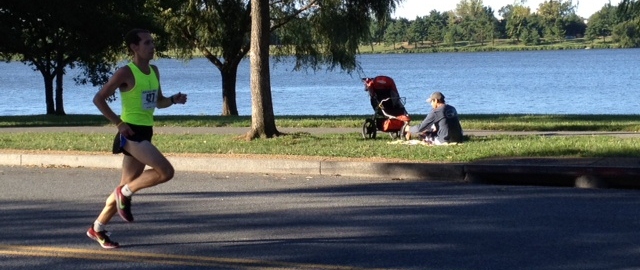Last weekend, I bombed the Boo! Run For Life 10k in Washington, DC. These days, it’s hard for me to put together a good race.

I contemplated writing thousands of words about how it just wasn’t my day, the dozen excuses I could fall back on, or maybe why you should even care.
But I realized that you probably don’t care that I ran slowly. My slow race doesn’t help you become a better runner – and that’s what Strength Running is all about, anyway.
So screw the lengthy race report. Instead, I’m going to give you the Cliff’s Notes version of the race with only the highlights. You can see what I did right, wrong, and what just was.
Then, and I think you’ll find this much more useful, I want to encourage you if you’ve had a bad race recently. Running slower than you think can be demoralizing, demotivating, and can seriously shake your confidence.
But one bad race – or even two or three – doesn’t define you as a runner. So join the brief pity party and then we can get our asses back in gear and ready to race faster.
The Shortest Race Report Ever
This year’s Boo! Run for Life 10k was held in West Potomac Park in Washington, DC on the opposite side of the peninsula as last year. My wife Meaghan ran it last year so this confused us and we ended up parking over a mile away from the actual start. Lesson learned: check the damn website!
And that was after driving into Virginia, getting lost on DC’s crazy highway system. Awesome.
My warm-up had to change because of our parking situation. It was 9 minutes of easy running before I got my number, then another 10 minutes of progressively faster running and five strides. I was feeling pretty good before the start – no doubt because of the Death Wish Coffee. It’s like liquid crack.
The horn sounded and we were off, racing south into a decent headwind along the Potomac River. The course is an out-and-back loop that curves around the tip of the peninsula and turns around in a small parking lot about halfway up along the East Potomac Golf Course.
For the math-inclined, here are my mile splits:
Mile 1: 5:30
Mile 2: 5:46
Mile 3: 5:41 (17:35 through 5k)
Mile 4: 5:36
Mile 5: 4:49 (yeah right)
Mile 6: 6:14 (yeah right)
Last .2: :59
I finished in 4th place overall (first in my age-group) in 34:39 – 58 seconds slower than my 33:41 PR from a cross country race from 2007. The silver lining is that my individual 5k splits are 17:35 and 17:04.
The race itself was managed and executed flawlessly so hat tip to the Run for Life team (the race supported renal cancer research). Well done.

The wind during the first two miles was pretty brutal. Though I tried to tuck behind the top 2-3 guys, I couldn’t keep up during the second mile and was lost in no-man’s land for the rest of the race without. That was a poor racing move but there wasn’t much I could do (except run faster!).
I’m at the point in my racing career where I’m only interested in running fast. I don’t care about having a “strong finish” or some other arbitrary marker of success. So when I go through 5k in 17:35, it’s clear that I would need a PR 5k in the second half to run a 10k PR.
And that’s impossible for me, so I mentally check out of the race. Why give a 100% effort and trash my legs when I won’t ultimately run fast? What’s the difference between 34:39 and 34:19 for me? Nothing.
Maybe I’m a complete headcase but if the first half of a race isn’t going well, then screw it. I’m out.
Enough whining, let’s figure out what to do!
How to Use a Bad Race as a Learning Experience
I recently watched an interesting interview with Alberto Salazar, head coach of the Nike Oregon Project and professional runners like Mo Farah, Galen Rupp, and Dathan Ritzenhein. He was discussing the mental part of training and racing and how vital it is to success.
We all intrinsically know this, but how many of us are truly mentally tough?
Most runners have a bad workout and freak out, myself included. Training can be progressing incredibly well and one bad race (even a relatively unimportant one) will throw you off. You’ll ask yourself unreasonable questions like:
Did I run too much, too soon? Were my workouts spaced out correctly?
Am I ever going to be able to break through this wall?
My entire month of racing is shot! What do I do??
Salazar laughed at these types of questions. In fact, his reaction was a simple: “So what?”
The truth is that one bad race doesn’t negate the hours of running you do every week.
A bad workout is not a good indicator of your fitness level.
You don’t simply get out of shape if you bomb a race or workout. It’s so important to being a good runner that you have a short-term memory. You need to forget the bad workouts, mediocre races, and sub-par performances.
Don’t place too much emphasis on any one training session – real breakthroughs happen after months of consistent work, not one great workout.
So stop feeling bad for yourself. You’re going to be fine. Learn as much as you can from the experience and make sure you do a good post-mortem to see what areas of the race or workout you can improve.
How I’m Going to Bounce Back from the Race for Your Life 10k
After a little bit of self-cheerleading, I’m ready to tackle my next hard workout and race. The memory of the 10k is rapidly fading but the lessons remain.
I need to be tougher and more competitive during the early miles. I need to race by feel and not be married to mile splits. I need to drink more pre-race coffee. And my workouts have to be harder.
I can still improve. And so can you.
Learn from your mistakes, pick up your bruised ego and get back on the horse. Work harder than you thought possible.